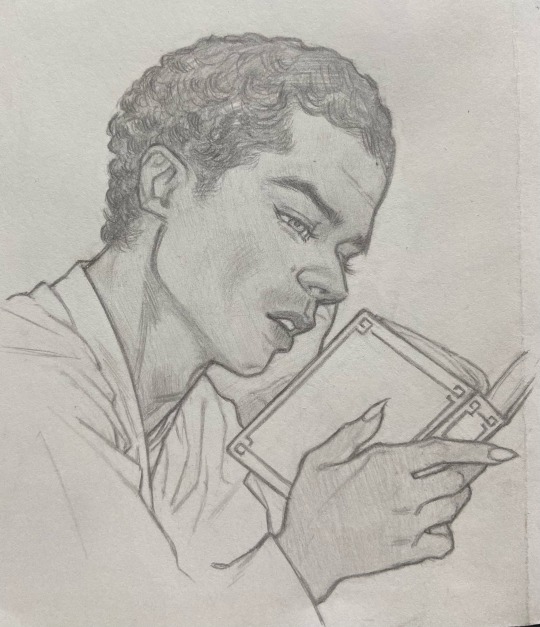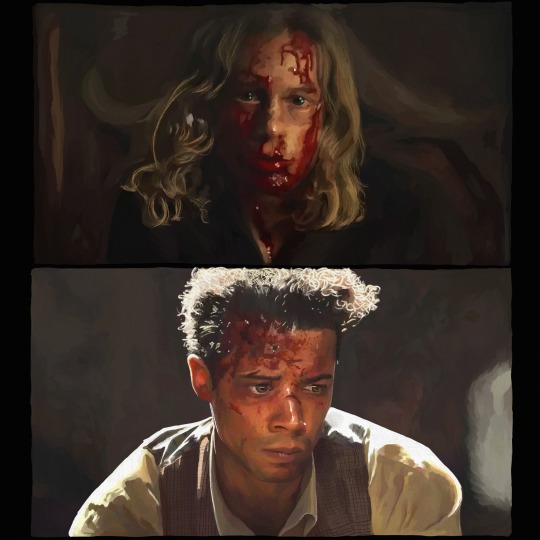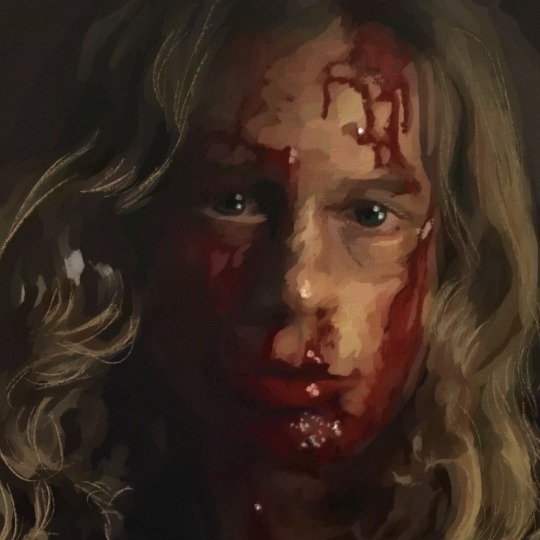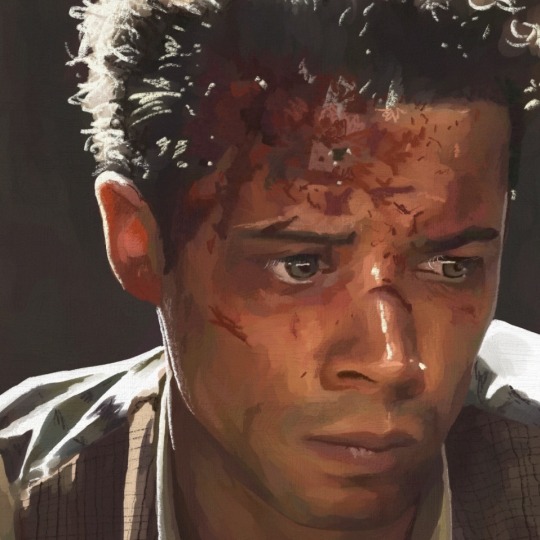Don't wanna be here? Send us removal request.
Text
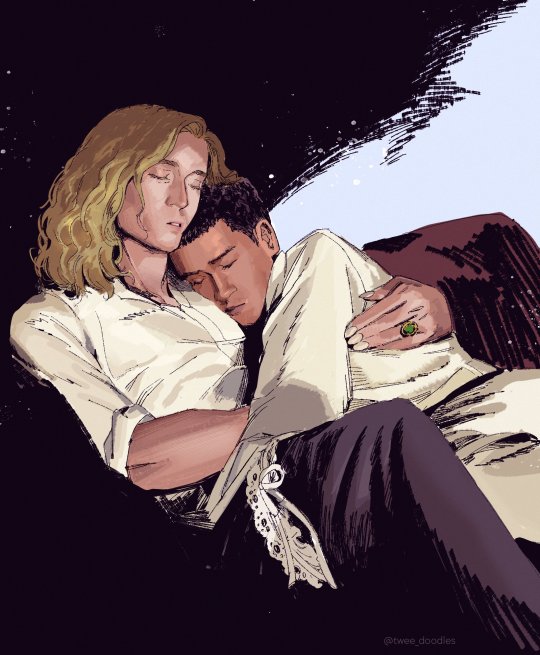
❤️Congratulations to them❤️
Eepy post wedding Loustat inspired by "Gabriele" 's wedding photos and videos, iykyk
2K notes
·
View notes
Text
the way his face shifted from passion and fury to kind of just... sorrow


1K notes
·
View notes
Text

now we're havin' fun
I'm losing my mind over the new content we got during SDCC 2025. I've been waiting my whole life for the rockstar Lestat representation of my dreams, and I'm so thrilled that Sam Reid is willing to be actually possessed by a Lestat tulpa to make those dreams come true. Thank you for your sacrifice, sir!
My Patreon
Commission Info
Donations
38 notes
·
View notes
Text
To be truly seen…
If I were writing Nickistat and Loustat for S3, I would focus specifically on the tragedy and the beauty and the truth of Lestat’s perspective of love and of how Lestat is able to develop such that he can love unconditionally, with Louis.
* Lestat did not truly see Nicolas. Not fully. He loved him deeply, but he loved an idealised version of him. He loved him like he was a work of art. He was afraid to look at his pain. He was afraid to see the all of Nicolas. Yet Nicki did see the all of Lestat. But that doesn’t matter. What matters is that Lestat did not wish to see the depth of Nicki’s pain. And when he was forced to see it at last (in the moment of turning him, when he was even more broken), he was revulsed by it. And so then-on, Nicolas became almost two versions of himself - Lestat’s idealised version who he would always love, and who becomes a cipher to Lestat's own lost humanity. And this new (but it was never really new, beyond how trauma broke it further) version, who Lestat could not bear - to know the truth of… and surely to know his responsibility in forging. And the tragedy is that to be truly seen and loved for the all of himself was the only way Nicolas had any hope of surviving. Nicki was not only not truly seen, but Lestat did not want to see. And then, when he did see, Nicki would perceive that Lestat found him unloveable, as he would always have feared.
* But Louis… Lestat *does* see Louis. From the first moment he chooses him, Lestat sees the all of Louis and he loves him unconditionally. And maybe he learned to love this way because Nicolas loved him this way. Or maybe he learned it from the mistakes of his youth and through time. Or maybe it was the care with which he watched and chose and saw Louis fully. But whatever the case, Lestat sees the all of Louis and loves it no matter what. There is nothing Louis could do or be that would kill Lestat's love. There is no corner of Louis that Lestat could ever be repulsed by. And it is all the more poignant as with Louis it’s harder at first. Because Louis doesn’t initially see the all of Lestat. Louis' love is not unconditional at first. But that’s alright, because Louis has the capacity to see Lestat and to know him and to understand him, and they have eternity. And maybe, at first - at last Lestat might understand something of how Nicolas felt about Lestat's love for him. But Louis is full of empathy and so he one day will love Lestat deeply and unconditionally... Deeply and unconditionally, as Lestat was never able to love Nicki.
And isn’t that just the most beautiful and true thing you could write about love? Its imperfection doesn’t make it lesser. And to learn to love a soul unconditionally is a beautiful thing.
But that makes it no less of a tragedy for Nicolas. So this one is for Nicolas - who wanted only to me met in his darkness, for all of him, his terror as well as his beauty… for the yearning of that, which I have attempted to give a beauty here to reflect how Lestat would perceive Nicki’s music - hewn from despair as beauty. When it is not that at all.
PS every time I look at my vampire friends by @toriangeli , I love something new about them. The balloon of Nicolas’ sleeves. It’s so perfect. My heart…
We could think about Nicki and Louis' love too... but I know there is less consensus here... my view on that is that the truth is still the truth and the fact that people see things differently lies not in ambiguity, rather in the fact that we are so deeply in Lestat's heart and mind so much of the time... however... I don't need to hurt my own heart by needlessly asking about that.

22 notes
·
View notes
Text



INTERVIEW WITH THE VAMPIRE S2E07 "I Could Not Prevent It"
6K notes
·
View notes
Text

a fun sketch because i watched s2ep6 tonight….. claudeline my absolute fucking beloved
573 notes
·
View notes
Text

Returning from my hibernation with another drawing of Lestat!
5K notes
·
View notes
Text
The Weight of Goodbye
Dream’s SoM-meetings with Hob Gadling, Lyta & Daniel Hall and his subjects

Sorry not sorry for using this one again, because I’m Jon J Muth’s no. 1 fan, plus it helps me to get over Kelley Jones’ art which I find… challenging 🤣
I’ve been thinking about The Sandman #22 for our reread, and while there are many gut-wrenching issues, this is one of the most quietly devastating ones. It’s a bit like Dream writing his will while pretending he’s just going on a business trip (and of course we get something similar again later on in The Kindly Ones 🥺)
The Speech to His Subjects
Dream addresses the denizens of The Dreaming before departing for Hell. He frames it a bit as instructions for his absence (and sounds super awkward when admitting he made mistakes—it’s honestly like car crash TV), but the emotional undertones suggest something far more permanent:
He tells them about how to maintain the realm if certain situations arise (like him not coming back, either because he dies or because he gets captured) and presents it like contingency planning (for lack of better term). But the truth of the matter is that he’s putting his affairs in order. The formality of it, the careful way he addresses potential concerns: This isn’t just someone covering all bases, this is a ruler preparing his kingdom for the real possibility that he won’t return. And it’s the first time we get told, in no uncertain terms, that if he gets destroyed (his choice of words, not mine), another aspect of Dream will take over.


[Also: Is it just me who thinks that Kelley Jones draws him at his most beautiful when he’s vulnerable? Because some of his other artistic choices are… well, definitely choices 🙈🤣]
What truly gets me is the narrative use of Matthew. He’s concerned, but he doesn’t grasp the hint of finality in Dream’s tone. And at this stage, the reader may not either (we need to remember that we didn’t have the type of hindsight we have now back when the comics first came out; we didn’t know how the whole run would end). So Matthew is, once again, a stand-in for us, the reader (that always makes me think of The Wake, and even after decades, I’m still not over Matthew's speech and his grief). It doesn't help that we’re starting to see their growing bond, and the cracks in Dream’s armour he hid only a minute ago when everyone else was still there:

“I wanted to stick around. Do you mind?” “No.” 😩
The Meeting with Lyta and Daniel
Dream’s visit to Lyta Hall and baby Daniel often gets brushed to the side a bit, and without the knowledge of what’s going to happen, I get it.
But of course we do know what has already happened in The Doll’s House. Even there, it was painfully obvious that Dream, at least on some level, had plans for Daniel. So yeah, this is not a social call; he’s checking in on his replacement (for lack of better term). They have a bond because Daniel was conceived (show)/gestated (comics) in the Dreaming. It’s not Morpheus who gives Daniel his name—it’s most likely Daniel who told him his name.
Lyta’s discomfort throughout the scene isn’t just about supernatural entities dropping by unannounced, or about her deep-seated hatred of Dream because she considers him responsible for Hector’s death. She knows, on an intuitive level, that he is marking Daniel in some way because he already told her back in The Doll’s House that he’ll one day come for the child. At the same time, he’s acknowledging here that this might be the last time he sees the child for a very long time, and that he means Lyta no harm (“today” 🙄). And maybe that’s the only explanation for this:

Because I don’t know about you: If a strange guy whom I deem responsible for my husband’s death tells me the “true” name of my yet unnamed child, I'd certainly not consider that name and smile about it happily…
Hob Gadling and the Toast

Dream appears to Hob in a dream, and that’s a deeply significant choice. He could have met him in the waking world just like Lyta, but instead, he chooses to visit Hob in his own domain, where he has absolute power. But he doesn’t really use that power here, other than for getting in contact in the first place. He rather reveals something that could almost be considered vulnerability:
That’s the same Dream who stormed off in a huff in 1889 because Hob dared to suggest they were friends. The same Dream who tentatively acknowledged that friendship in 1989. The same Dream who now decides to say goodbye to the one person he actually considers a friend. For someone whose entire existence is built on pride and hierarchy, this shows character growth. But it also shows how desperately alone he really is, and that he doesn't want to be a burden to anyone (and that's compounded to the umpteenth degree when they meet the next time 😔).
But there’s subtext here that’s even more heartbreaking: Dream is settling his accounts. He’s making sure that if he doesn’t return from Hell, Hob won’t spend the next century wondering where Dream is, or if their friendship was real. By choosing to appear in Hob’s dreams, he’s giving him something lasting: a memory. And many of us know that this will be one of the cornerstones of Sunday Mourning.
The tragedy is that Hob doesn’t even truly realise this is a goodbye, and he hopes he’ll be back “eventually”. He's happy to have seen his friend, even if it was "just a silly dream"...
Patterns...
When you read these three sequences together, you can't help but see that Dream is systematically saying goodbye to the, at least at this point, three most important cornerstones of his existence: his successor (Daniel), his one true friendship (Hob), and his realm.
This isn’t the behaviour of someone who expects to return unchanged from his mission. This is someone who understands that going to Hell to demand the release of an ex-lover he condemned 10,000 years ago is likely to have consequences he may not survive.
Which brings us to the most important question of this issue:
Does Dream already know he will die?
I don’t think he knows, at this point, specifically how or when. But I think he does understand that his existence is reaching some kind of conclusion. The family intervention, the guilt over what he has done to Nada which makes him return to Hell: They’re really only the culmination of ten billion years of accumulated mistakes and regrets, and it’s only going to get worse from here.
The paradox is that Dream is finally ready to change, but change is antithetical to how he perceives himself. So perhaps, on some level, he understands that real change might require becoming someone else entirely. And that is something I think he does know at this point.
What makes issue #22 so powerful is how it recontextualises everything that comes after. When he eventually faces his final choice in The Kindly Ones, we can look back and see that he was already preparing himself here (and if you know me, you will also know that I staunchly insist he already made an, albeit subconscious, choice in #8). Maybe it’s a masterclass in dramatic irony: Dream thinks he’s being practical with making his contingency plans. But we can see him subconsciously preparing for an ending he hasn’t yet acknowledged to himself. But he also has...
Kelley Jones’ Art
I just briefly want to brush (no pun intended) on how Kelley Jones’s art reinforces these themes. His Dream is somehow always in shadow, even if it’s just his face. There’s a weight to him in every panel, a sense of someone carrying an enormous burden. I am generally not a fan of Jones' art (sorry), and I find his constantly changing Dream difficult to get used to (but I guess that's the point, and I totally get it on a conceptual level). But one thing stands out to me: The way he draws Dream against various backgrounds (Lyta’s apartment, the dreamscape with Hob, the throne room) consistently makes him seem isolated, separate, already partially absent. Even when he’s surrounded by other people/beings. But maybe I'm just reading too much into it…
Anyway, to put it all in a nutshell: The real tragedy, but also the deeper meaning of The Sandman, is that Dream tries to make amends for a lifetime of mistakes, only to discover that some changes require transformation so complete that the self doesn’t survive the process. But in metaphorical terms, the death of the ego is also a beautiful and necessary thing…
55 notes
·
View notes
Text
Behold!

I did an art!

This was my reference, and I'm so happy with how it turned out.
If I can get my hands on it i want some varnish or something to bring out the contrasts of the different shades of black in his hair.
I also used this as a chance to practice my values, and I think I did good!
I love my lil wet cat guys.
Also. Here's him with a 30 second drawing of a cowboy hat because my friend is obsessed with cowboys.

9 notes
·
View notes


